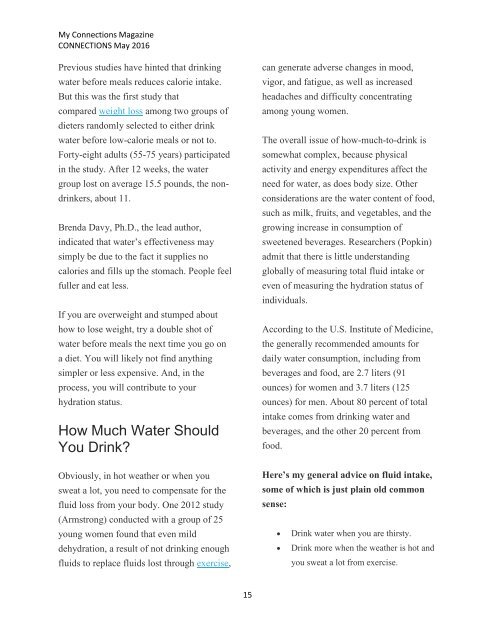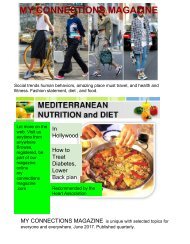CONNECTIONS THE MAY FLOWERS IISSUE MAY 2016
FAMOUS MAYFLOWER SHIP AND THE STORIES BEHIND IT. ABOUT HEALTH AND FASHION
FAMOUS MAYFLOWER SHIP AND THE STORIES BEHIND IT. ABOUT HEALTH AND FASHION
Create successful ePaper yourself
Turn your PDF publications into a flip-book with our unique Google optimized e-Paper software.
My Connections Magazine<br />
<strong>CONNECTIONS</strong> May <strong>2016</strong><br />
Previous studies have hinted that drinking<br />
water before meals reduces calorie intake.<br />
But this was the first study that<br />
compared weight loss among two groups of<br />
dieters randomly selected to either drink<br />
water before low-calorie meals or not to.<br />
Forty-eight adults (55-75 years) participated<br />
in the study. After 12 weeks, the water<br />
group lost on average 15.5 pounds, the nondrinkers,<br />
about 11.<br />
Brenda Davy, Ph.D., the lead author,<br />
indicated that water’s effectiveness may<br />
simply be due to the fact it supplies no<br />
calories and fills up the stomach. People feel<br />
fuller and eat less.<br />
If you are overweight and stumped about<br />
how to lose weight, try a double shot of<br />
water before meals the next time you go on<br />
a diet. You will likely not find anything<br />
simpler or less expensive. And, in the<br />
process, you will contribute to your<br />
hydration status.<br />
How Much Water Should<br />
You Drink?<br />
Obviously, in hot weather or when you<br />
sweat a lot, you need to compensate for the<br />
fluid loss from your body. One 2012 study<br />
(Armstrong) conducted with a group of 25<br />
young women found that even mild<br />
dehydration, a result of not drinking enough<br />
fluids to replace fluids lost through exercise,<br />
can generate adverse changes in mood,<br />
vigor, and fatigue, as well as increased<br />
headaches and difficulty concentrating<br />
among young women.<br />
The overall issue of how-much-to-drink is<br />
somewhat complex, because physical<br />
activity and energy expenditures affect the<br />
need for water, as does body size. Other<br />
considerations are the water content of food,<br />
such as milk, fruits, and vegetables, and the<br />
growing increase in consumption of<br />
sweetened beverages. Researchers (Popkin)<br />
admit that there is little understanding<br />
globally of measuring total fluid intake or<br />
even of measuring the hydration status of<br />
individuals.<br />
According to the U.S. Institute of Medicine,<br />
the generally recommended amounts for<br />
daily water consumption, including from<br />
beverages and food, are 2.7 liters (91<br />
ounces) for women and 3.7 liters (125<br />
ounces) for men. About 80 percent of total<br />
intake comes from drinking water and<br />
beverages, and the other 20 percent from<br />
food.<br />
Here’s my general advice on fluid intake,<br />
some of which is just plain old common<br />
sense:<br />
Drink water when you are thirsty.<br />
Drink more when the weather is hot and<br />
you sweat a lot from exercise.<br />
15


















